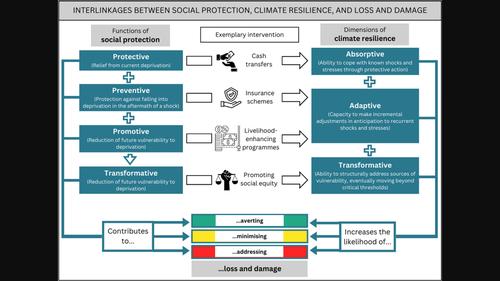当前位置:
X-MOL 学术
›
WIREs Clim. Chang.
›
论文详情
Our official English website, www.x-mol.net, welcomes your
feedback! (Note: you will need to create a separate account there.)
Turning climate justice into practice? Channeling loss and damage funding through national social protection systems in climate-vulnerable countries
WIREs Climate Change ( IF 9.4 ) Pub Date : 2023-11-07 , DOI: 10.1002/wcc.867 Jona Huber 1, 2 , Una Murray 1, 2
WIREs Climate Change ( IF 9.4 ) Pub Date : 2023-11-07 , DOI: 10.1002/wcc.867 Jona Huber 1, 2 , Una Murray 1, 2
Affiliation

|
Despite the last-minute breakthrough agreement at the UN Climate Change Conference COP27 to provide funding for climate-related loss and damage for vulnerable countries, distribution mechanisms and funding sources remain up for debate. With rapid-onset climate impacts intensifying and slow-onset impacts further manifesting, loss and damage from climate change is already occurring. Thus, quick, effective, and transparent distribution of upcoming funds is necessary. Currently, only a tiny fraction of existing sources of climate finance reach affected communities, commonly marked by high levels of poverty, and low levels of adaptive capacity. Similarly, donor-based global humanitarian aid and development systems are buckling under the weight of increasing demand. As increasing climate impacts threaten to reverse development gains of the last decades, climate-sensitive social protection has received increasing attention for its potential to address climate impacts, and to strengthen the adaptive capacity and resilience of climate-vulnerable populations. This review article explores the prospects of channeling Loss and Damage funding through existing national social protection systems and highlights how this approach can efficiently contribute to safeguarding development gains, including previously overlooked aspects such as noneconomic loss and damage (NELD), while also dismantling soft adaptation barriers and thus fostering climate resilience in the long term. Although we identify barriers, including gaps in coverage of social protection systems both between and within countries, we argue that channeling some L&D funding through social protection systems aligns with core human rights and climate justice agendas, as well as the principle of Common But Differentiated Responsibilities and Respective Capabilities principle.
中文翻译:

将气候正义付诸实践?通过气候脆弱国家的国家社会保障体系引导损失和损害资金
尽管联合国气候变化大会第 27 届缔约方会议在最后一刻达成了突破性协议,为脆弱国家与气候相关的损失和损害提供资金,但分配机制和资金来源仍然存在争议。随着快速发生的气候影响加剧和缓慢发生的影响进一步显现,气候变化造成的损失和损害已经发生。因此,快速、有效和透明地分配即将到来的资金是必要的。目前,现有气候资金来源中只有一小部分到达了受影响社区,这些社区的特点通常是贫困程度高、适应能力水平低。同样,以捐助者为基础的全球人道主义援助和发展系统也在不断增长的需求的重压下崩溃。随着日益严重的气候影响有可能逆转过去几十年的发展成果,气候敏感型社会保护因其解决气候影响、加强气候脆弱人群的适应能力和复原力的潜力而受到越来越多的关注。本文探讨了通过现有国家社会保障体系引导损失和损害资金的前景,并强调了这种方法如何有效地促进保障发展成果,包括以前被忽视的方面,例如非经济损失和损害(NELD),同时也拆除软适应障碍,从而促进长期的气候适应能力。尽管我们发现了一些障碍,包括国家之间和国家内部社会保障体系覆盖范围的差距,但我们认为,通过社会保障体系输送一些学习与发展资金符合核心人权和气候正义议程,以及共同但有区别的责任原则和各自能力原则。
更新日期:2023-11-08
中文翻译:

将气候正义付诸实践?通过气候脆弱国家的国家社会保障体系引导损失和损害资金
尽管联合国气候变化大会第 27 届缔约方会议在最后一刻达成了突破性协议,为脆弱国家与气候相关的损失和损害提供资金,但分配机制和资金来源仍然存在争议。随着快速发生的气候影响加剧和缓慢发生的影响进一步显现,气候变化造成的损失和损害已经发生。因此,快速、有效和透明地分配即将到来的资金是必要的。目前,现有气候资金来源中只有一小部分到达了受影响社区,这些社区的特点通常是贫困程度高、适应能力水平低。同样,以捐助者为基础的全球人道主义援助和发展系统也在不断增长的需求的重压下崩溃。随着日益严重的气候影响有可能逆转过去几十年的发展成果,气候敏感型社会保护因其解决气候影响、加强气候脆弱人群的适应能力和复原力的潜力而受到越来越多的关注。本文探讨了通过现有国家社会保障体系引导损失和损害资金的前景,并强调了这种方法如何有效地促进保障发展成果,包括以前被忽视的方面,例如非经济损失和损害(NELD),同时也拆除软适应障碍,从而促进长期的气候适应能力。尽管我们发现了一些障碍,包括国家之间和国家内部社会保障体系覆盖范围的差距,但我们认为,通过社会保障体系输送一些学习与发展资金符合核心人权和气候正义议程,以及共同但有区别的责任原则和各自能力原则。































 京公网安备 11010802027423号
京公网安备 11010802027423号